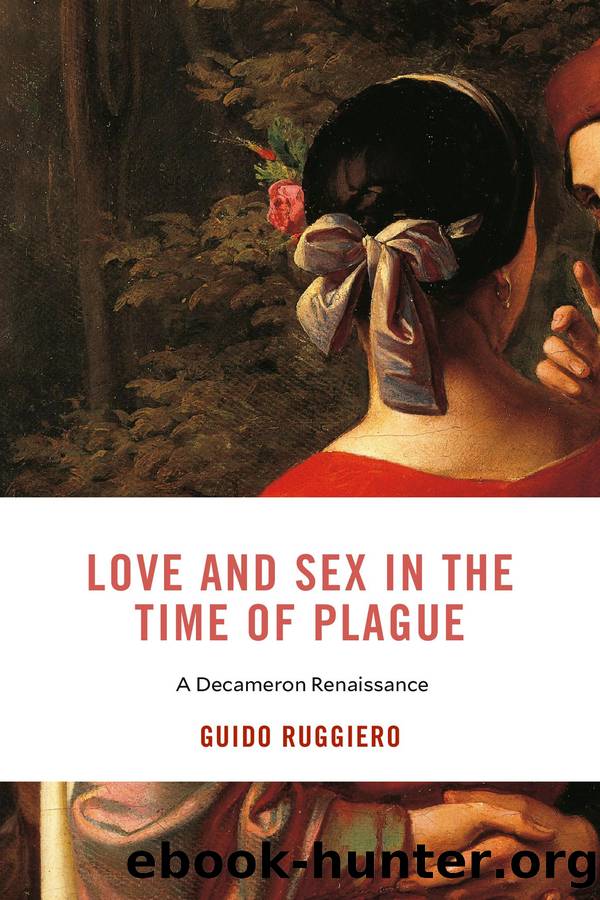Love and Sex in the Time of Plague by Guido Ruggiero

Author:Guido Ruggiero
Language: eng
Format: epub
ISBN: 9780674259560
Publisher: Harvard University Press
Published: 2021-03-08T00:00:00+00:00
Where Gualtieri Decides to Marry in His Own Way and Insists His Subjects Honor the Bride That He Will Pick
In the end, then, although he reluctantly gave in to his subjectsâ demands, he decided to do so in his own way. And, once again, the way he arranged his marriage would have troubled contemporaries. Actually, of course, arranged marriages were the norm in fourteenth-century Florence. But typically they were negotiated by parents or relatives to secure family alliances, whereas instead Gualtieri took his marriage personally in hand to secure his selfish desires with no concern for his family or his subjects. Beyond that troubling novelty, his motives for arranging his marriage also evoked the negative presentation in Decameron stories of arranged marriages more generallyâthat is, they overlooked love and thus led to unhappy matches, especially for young women. The brigata and their tales over and over again advocated avoiding such unhappy situations by advocating marrying for true love, exactly what Gualtieri aggressively rejectedâa beastly character indeed. From his perspective, marrying for love and loving his wife in the shared emotional world of such a match would have endangered his solipsistic self-serving life, focused on his own personal and noble pleasures. Moreover, at the same time that such a marriage would undermine those pleasures, it would also signal the end of his freedom from his responsibilities as a ruler and declare that he had acquiesced in becoming the signore / prince he was supposed to be and that his subjects demanded he become.
Making his disgruntlement clear, when Gualtieri finally did knuckle under to his subjectsâ demands that he marry, he insisted, however, âBut given that you insist in binding me in these chains and given that I insist on being content, in order to not hold anyone to blame but myself if worse comes to worst, I insist on choosing [my wife].â29 He then continued to warn his followers that whoever he might chose, he expected and demanded that they honor the woman as their lady or feel his anger for having forced him to marry against his will. Evidently, with this warning, he was suggesting that the wife he might pick in some way might not match up to the ideal wife that his subjects expected of their prince.30 The reality behind that warning was soon to be dramatically revealed. For Gualtieri, according to Dioneo, had for some time been observing a peasant girl who lived in a nearby village. She was beautiful, as required by such stories, even if she was a peasant. Yet, crucially, what made her most attractive to Gualtieri was the fact that âhe considered that with her he could live very comfortably (assai consolata).â31 In other words, he was confident that she would not interfere with his youthful noble pleasures that he was so anxious to protect and, in turn, neither love nor its accompanying sexual pleasures entered into his decision on a wife.
Following Gualtieriâs misplaced desires, we are drawn ever deeper into the dark morass of arranged marriages as his matrimonial plans unfold.
Download
This site does not store any files on its server. We only index and link to content provided by other sites. Please contact the content providers to delete copyright contents if any and email us, we'll remove relevant links or contents immediately.
Love Your Life by Sophie Kinsella(1265)
Albion by Peter Ackroyd(1065)
The Hell of it All by Charlie Brooker(896)
How To Be A Woman by Caitlin Moran(865)
All in a Don's Day by Mary Beard(846)
Albion: The Origins of the English Imagination by Peter Ackroyd(829)
A Dictionary of Literary Symbols by Michael Ferber(798)
The Eye in the Triangle: An Interpretation of Aleister Crowley by Israel Regardie(762)
Protector by Conn Iggulden(760)
Dot Con by James Veitch(741)
English Literature: A Very Short Introduction by Jonathan Bate(712)
Less: Winner of the Pulitzer Prize for Fiction 2018 by Andrew Sean Greer(648)
English Literature: A Very Short Introduction (Very Short Introductions) by Bate Jonathan(599)
I, Partridge by Alan Partridge(585)
The Songbook of Benny Lament by Amy Harmon(582)
Katharine Parr, the Sixth Wife by Alison Weir(557)
Mussolini: His Part in My Downfall by Spike Milligan(547)
Work! Consume! Die! by Boyle Frankie(544)
The Cambridge Introduction to Jane Austen (Cambridge Introductions to Literature) by Janet Todd(538)
